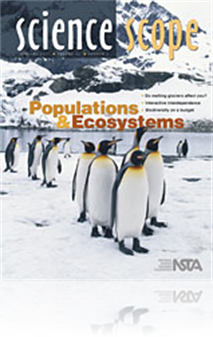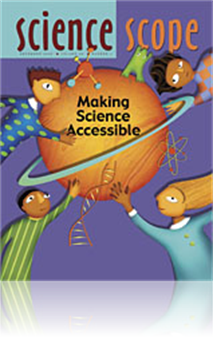All Science Scope resources
Journal Article
Science Sampler: The biological budget
Students often have difficulty grasping the complexity of ecosystems and the importance of biodiversity. The following activity applies students’ creativity and basic math skills to creating a sustainable and diverse food web. The biological budget...
Journal Article
Incorporating Amphibian Malformation into Inquiry-Based Learning
Since the first discovery of malformed frogs by an adventurous middle school teacher and her after-school science club in 1995, outreach programs like A Thousand Friends of Frogs (see Resources) have been created to connect students and teachers with...
Journal Article
Summarizing with Drawings: A Reading-Comprehension Strategy
The development of literacy skills is essential for student success. According to the National Science Education Standards, “Scientific literacy entails being able to read with understanding articles about science in the popular press and to engag...
Journal Article
After the Bell: Making a community information guide about nonpoint source pollution
A good slogan to introduce this project is “think globally, act locally.” The purpose of the project is to inform students that the actions they take at home may have a far-reaching effect. The assignment will help to create community awareness a...
Journal Article
Teacher’s Toolkit: Making the most of concept maps
A concept map is a two-dimensional, graphic or schematic diagram illustrating the interconnections, and often the hierarchy, of a particular concept or topic. Concept maps are especially important in teaching science because they depict the interrela...
Journal Article
Tabizi Pythons & Clendro Hawks: Using Imaginary Animals to Achieve Real Knowledge about Ecosystems
In the engaging unit described here, imaginary organisms are used to teach a variety of topics related to ecosystems—food chains and energy flow, food webs, limiting factors, carrying capacity, and the effects of natural and human-made events on ec...
Journal Article
Scope on Safety: Is safety included in your science activity kits?
For some school districts, the convenience, organization, curriculum scope, and sequence provided by science kits make them a tempting choice for incorporating hands-on, process- and inquiry-based science in the classroom. When teachers consider adop...
Journal Article
Science Sampler: Ozone notebook
To combat the problems associated with high levels of ground-level ozone, the Clean Air Act of 1970 called on all government agencies to take measures to reduce ground-level ozone in our air to 120 parts per billion (ppb). Detection of ozone levels i...
Journal Article
Editor’s Roundtable: Granny knew best!
If our citizens are ever to be effective stewards of our environment, acting responsibly needs to be modeled and taught at home, and reinforced by the school and the rest of the community. We must also get our students out of the classroom and into t...
Journal Article
Science Sampler: Bubbles on a soda can: A demonstration of Charles’s Law
The bubbles-on-a-soda can activity is an illustration of Charles’ law, which states that for a fixed amount of gas, there is a direct relationship between the temperature of the gas and its volume. In other words, if the temperature of a fixed amou...
Journal Article
Tech Trek: The size of things to come
While using photos and illustrative images for teaching purposes is very appealing, you are likely to find that digital images of any kind take up a lot of storage space. In fact, many of the technological enterprises that teachers undertake are stor...
Journal Article
Editor's Roundtable: Leveling the playing field
Special education has evolved from separate classroom settings, to pull-out programs, to mainstreaming, to the current practice of full inclusion. Inclusion involves many more regular education teachers than did previous special education programs. I...
Journal Article
Personal Care Chemistry as a Bridge to Careers in Science and Technology
This activity in personal care chemistry seeks to provide middle school girls with an opportunity to learn firsthand about science and engineering technology. The activities--the preparation of lip balm and hand lotion--are fun, easy to do, and they ...




